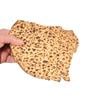Often, a person is so humble and down-to-earth that their true greatness and most noble deeds are only revealed after their passing. Such was the life of my great-uncle, Jacob ("Chic") Hecht who passed away Monday, May 15, 2006 at 77 years old.
Though his life was certainly far from ordinary—Chic held the highest political office of any Jew in Nevada’s history—he will mostly be remembered for his unassuming character, as a humble and genuine man who always had a smile on his face. U.S. District Judge Philip Pro, whom Hecht nominated to the bench in 1986, said "He always had a smile. What you saw was what you got. He was very kind to everyone."
The highlight of his political career was as Republican US Senator from Nevada from 1983-1989. As senator, he continued to lead as unpretentious a life as possible and always got along with everyone. Although he disagreed with many of his fellow politicians and held staunchly to his ideals and philosophies, Chic was not one to be dragged into dirty name-calling politics. As U.S. Senate Minority Leader Harry Reid, D-Nev., who served with Hecht both in the Legislature and in the U.S. Senate stated, "We represented different parties, but we always had a very good relationship. Chic had a wonderful family and he had a great career in business and politics."
Russian Jews always held a special place in Chic's heart, since his mother, Henna was herself a Russian Jewess having emigrated from Kiev as a young girl. Much of his activism both before and during his political career was driven by his innate connection to Russia Jewry and his deep rooted love for his people.
During his first year as senator in 1983, Chic took the time to join the Lubavitcher Rebbe, at a "Farbrengen"--a Chassidic gathering customarily conducted by the Rebbe on auspicious days. The Rebbe devoted much of his talk to the subject of Russian Jews who were then trapped behind the Iron Curtain by a Communist regime who held much of the world in its grip during the Cold War. When Chic went up to speak to the Rebbe privately, the Rebbe said, “Since I am not in the Senate you will be my representative and speak in my place, and you will try to help the Jews in Russia.” Although he had already been somewhat involved in the cause to free the Refuseniks, Chic, realizing the intensity of the situation, dedicated the remainder of his political career and power in the Senate on behalf of Russian Jewry. He devoted countless hours, negotiated with and persuaded politicians from all spectrums, and spoke to President Reagan regarding the urgency of opening channels to ensure the freedom of desperate Russian Jews. With the assistance of some well known activists, he compiled a handwritten list of thousands of Refuseniks who were in dire need of being liberated. Most famous on that list was Natan Scharansky, presently a member of the Israeli government.
In 1982, Mr. Max Kampelman, then chairman of the U.S. delegation to a meeting in Madrid of the Conference on Security and Cooperation in Europe, met with Secretary of State George Schultz and suggested that perhaps as a condition to concluding negotiations with the Soviets, they should release Jewish and jailed human rights activists. Mr. Schultz acted on this suggestion by arranging a meeting with the president an hour later. They spoke about Mr Kampelman's impending meeting and as he was leaving, President Reagan opened his desk drawer, turned to him, took out a sheet of paper and said: "Max, see what you can do to help these people." The paper contained a list of Jewish Refuseniks, which Chic had helped compile. Ultimately, Mr. Kampelman’s meeting in Madrid was successful. Russian president Yuri Andropov granted the KGB general, who was his representative, permission to negotiate on the condition that no one, including Russian officials, other than the president and Mr. Schultz be aware of the proceedings. Later that year many Jews and jailed human rights activists were freed from behind the Iron Curtain, as a result of that meeting.
To Senator Hecht's good fortune, President Reagan, who eventually famously helped bring about the collapse of the Iron Curtain, supported and helped his efforts. Before the president traveled to meet Gorbachev at a summit in Reykjavik, Iceland, in 1986, Chic gave the president the list he had compiled. The President used this list as part of his negotiations with the Soviets, and shortly after the meeting many of those Russian Jews listed were suddenly and quietly released.
This is perhaps Chic’s true legacy and the greatest testimony to his character lies in one of the least told, yet most courageous stories of his political career: his unending drive and effort to secure the release of Russian Jewry.
These are just some of the episodes concerning the release of Soviet Jews in which Uncle Chic was involved. Many and perhaps most of the negotiation and behind-the-scenes maneuverings in those tense times of the Cold War will never be known. Yet that was Chic, always caring and helping without the need of recognition. As former Rep. Barbara Vucanovich, R-Nev said, "He was a humble guy, a genuine guy. People always underestimated Chic. He was very proud of his heritage, very proud of his family and very involved in raising his daughters."
There are countless men, women and children who unknowingly owe their very lives to someone who never wanted their thanks. He was satisfied watching their freedom from a distance. Surely he is reaping his deserved reward now.









Join the Discussion